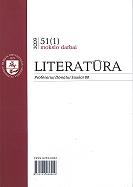EROZIJOS TEMA CZESŁAWO MIŁOSZO KŪRYBOJE: SVARSTYMAI LIETUVIŲ LITERATŪROS AKIVAIZDOJE
THE TOPIC OF EROSION IN THE WORKS OF CZESŁAW MIŁOSZ FROM THE PERSPECTIVE OF LITHUANIAN LITERATURE
Author(s): Audinga Peluritytė-TikuišienėSubject(s): Literary Texts
Published by: Vilniaus Universiteto Leidykla
Summary/Abstract: The creation of Polish literature classic Czesław Miłosz (1911–2004) is being discussed in this article. It is proposed that the Christian time and history are more important that space and its experiences in the creation of Miłosz. History is a time of God, Creator, that is given to human being, but that time of history is finite, and knowable in that way only. The time of history is given to human so that he could realize his will by creating culture, civilization, by being in action in the world. The gift of knowledge is given to human in the presence of God, Creator, and so the responsibility for the surrounding matter of the planet. Human inevitably consumes the nature of the planet he lives on by his activity, and embroils into a difficult creative process. The erosion of nature is a consequence of human activity in history. Miłosz ponders upon the categories of human history and nature by invoking plenty of cultural contexts. The Christian eschatology – one of the most important of them. But Lithuanian literature, entering Polish literature mainly through biographic and creative experience of Miłosz, almost does not know such eschatological, Christian time. The Lithuanian lite¬rature reasons in a perspective of natural, entropic time, and consequently the questions of Christianity, civilization, history exist in Lithuanian literature un¬der a different – alternative – programme of natural religion and worldview.
Journal: Literatūra
- Issue Year: 51/2009
- Issue No: 1
- Page Range: 57-70
- Page Count: 14
- Language: Lithuanian

